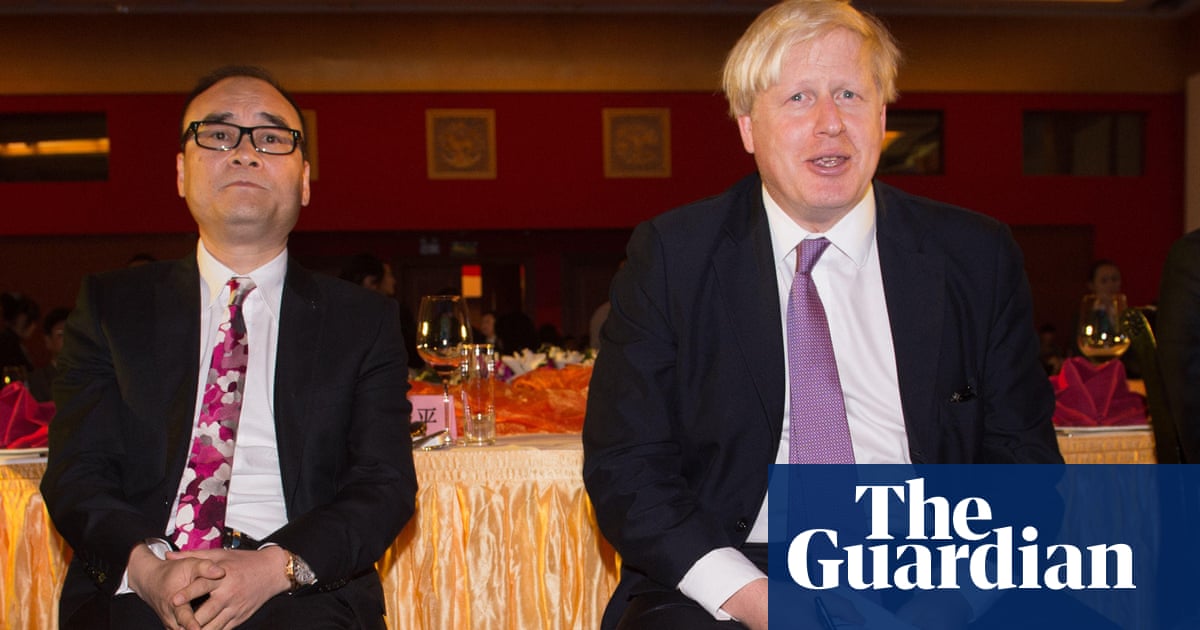
Show caption Boris Johnson on a visit to China. Photograph: PA Images/Alamy Conservatives Tory MPs warn of backlash against easing of UK-China trade Boris Johnson is driving change of approach despite party voices campaigning on Uyghur genocide Jessica Elgot @jessicaelgot Thu 17 Feb 2022 15.23 GMT Share on Facebook
Share on Twitter
Share via Email
Conservative MPs have warned of a parliamentary backlash following steps taken by the government to ease tensions with China, designed to pave the way for better trading relations.
Over the past few weeks, Boris Johnson has quietly signalled a thaw in frosty relations since the decision in 2020 to exclude Chinese telecoms giant Huawei from the UK’s 5G network.
His communications chief, Guto Harri, is a former spinner for Huawei, though his previous chief of staff, Dan Rosenfield, had also been an advocate of mending relations.
The prime minister has ordered a restart of the UK-China Joint Economic and Trade Commission [Jetco] and this year Rishi Sunak is understood to be on the verge of agreeing the return of annual trade summit, the 11th UK-China Economic and Financial Dialogue (EFD), which has not been held since 2019.
“The Treasury cannot shake the orthodoxy that we must have better trading terms with China,” one senior source said. “But it is Downing Street who really wants this. Boris has always been uneasy about having to cancel Huawei.”
The EFD has previously been used to announce lucrative commercial contracts and closer trade cooperation but a Treasury source played down the significance of the return of the EFD, “if it goes ahead at all”, and said it would be a chance for dialogue rather that leading to any major changes.
The source said it was wrong to portray Sunak as the driving force. “It’s the chancellor’s view that our principles should guide our relationship with China. We need to be eyes wide open about their increasing international influence and must take a principled stand on issues that conflict with our own values.”
The move to defrost relations with Beijing is understood to be a source of tension between Johnson and his foreign secretary, Liz Truss. “Liz is a proper China hawk,” another senior government source said. Truss is scheduled to meet the delegation of MPs who were banned from China for lobbying for sanctions to oppose the Uyghur genocide in the coming days.
The UK’s trade deficit with China has more than tripled in the last year, importing £40.5bn more from China than it exported to the country.
Any significant change of approach threatens to reopen splits with backbenchers, especially those who have been blacklisted by Beijing and who are understood to feel they have received no tangible support from government, including on crucial issues like cybersecurity.
Sir Iain Duncan Smith, the former cabinet minister, said it “beggars belief that we are about to re-invent the failed project kowtow” and blamed the Treasury and Downing Street for an overeagerness to normalise relations. “Whether it is the CCP’s illegal seizure and militarisation of the South China seas or the trashing of the Sino/British agreement on Hong Kong, the Treasury seems ready to turn a blind eye to it all.”
There is also continued frustration about Johnson’s stonewalling over the appointment of Tim Loughton, one of the MPs banned from China, to the chair of the Conservative Human Rights commission.
The body had been a leading internal Tory pressure group, particularly on Hong Kong which led to its blacklisting by Beijing, but Johnson has declined to approve Loughton as chair for more than a year. Its previous chair, Fiona Bruce, resigned after being appointed a special envoy on religious freedom by Johnson.
Loughton has been a strong critic of the prime minister’s conduct over “partygate” as well as the cut to international aid. The rights activist Benedict Rogers, the commission’s deputy chair, is understood to have privately expressed deep frustration at the impasse. Rogers declined to comment.
Another source from inside the group said they were “deeply troubled about this government’s commitment to freedom and human rights, the rule of law and democracy”.
Other MPs who have been sanctioned include Tom Tugendhat, chair of the foreign affairs select committee, Nus Ghani, the former transport minister who has been a leading campaigner on Uyghur genocide, and Neil O’Brien, the Levelling Up minister.
The sanction came after their campaign to insert a clause in the trade bill, which would have permitted the high court to make a preliminary ruling on whether genocide was occurring in a potential trading partner, a clause design to put barriers on a trade deal with China.
Loughton, MP for East Worthing and Shoreham, said the government should be aware of a significant parliamentary backlash to any change of approach towards China.
“Parliament has made it very clear that a government guilty of genocide needs to be treated with extreme caution and cannot be welcomed as an equal partner,” he said. “It would be an insult to parliament if the government were to ignore our concerns not least when seven Parliamentarians remain sanctioned simply for speaking the truth and standing up to China’s bullying and abuse.”
Bob Seeley, who will lead a backbench debate on China next week, said: “We need to engage, but we have to engage as much on our own terms as possible and was understanding the risks of doing so.
“I think we have not yet got our heads around these new authoritarian states and both the obvious threats they pose but also the more subtle threats they pose. We are trying to have business as normal. The world has changed. You’re not a sabre-rattler or a war monger for stating what everyone can see.”







